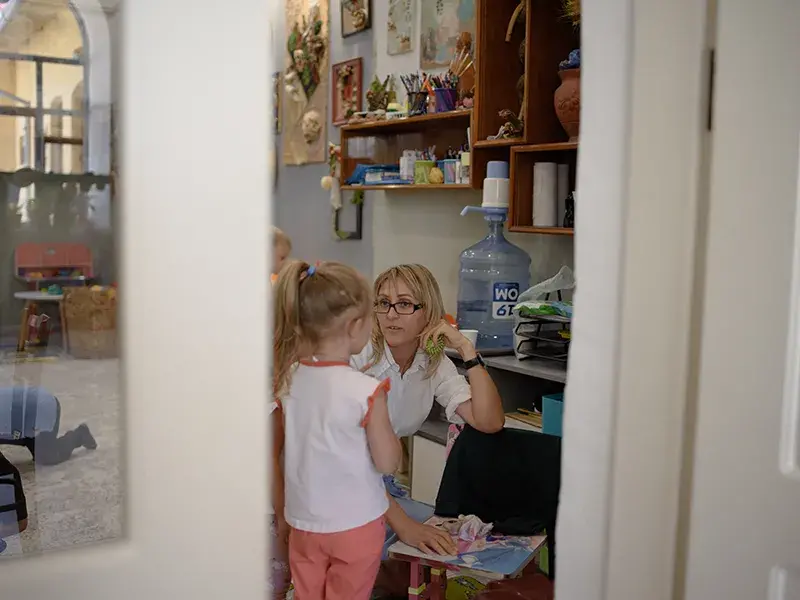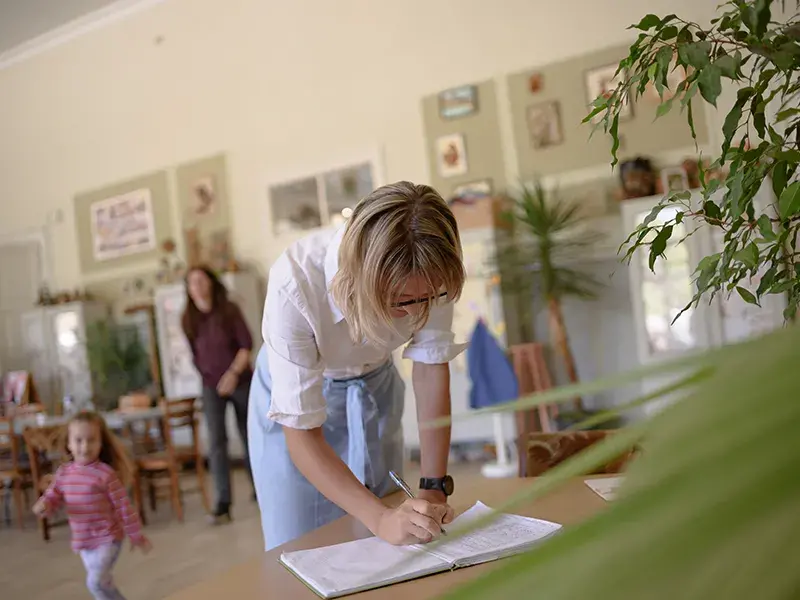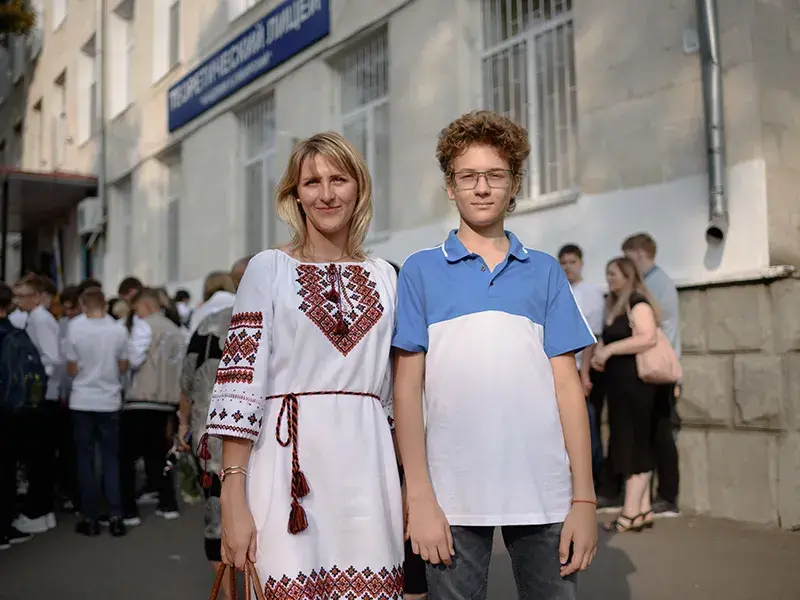Photos
Life on Pause - Story of Raisa, teacher

For many Ukrainian refugees, the decision to leave their homeland was not a choice, but a necessity. Fleeing from the horrors of war, their lives were suddenly upended, and they found themselves in a foreign land with uncertain futures. This transition to a life in exile created an emotional vacuum that many describe as feeling like life is on hold.
With her son Mykola Raisa lived on the left bank of Kyiv and worked as a children's methodologist. On the 24th of February 2022, she was preparing to take a refresher course, but instead they woke up to the sounds of approaching war. At first, they hid in the basement, but very quickly Raisa realised that: "underground is no life and something has to be done". In early March, she packed her suitcases, and together with her son, at the second attempt, they arrived at the railway station in Kiev - from there the evacuation train took them to Kamenets-Podolsk, and further to the border of Moldova. "At the border we immediately felt that they were waiting for us here."
Arriving in Chisinau on the 6th of March, it was far from a smooth transition, but they were determined to move forward and things started to seem to work. Her son Kolya started school on the 11th of March, and a job in a kindergarten, in a Russian-speaking group, came along. In August 2022, Raisa secured a job at the Center for Youth Ecologists, where she mainly works with Ukrainian families, emphasizing the importance of preserving the Ukrainian language.
"At first life really was on pause, then it came to me that time goes on - life goes on and you can't sit around all the time waiting for things to change."
It is more challenging for Kolya in this respect - he is a teenager who still has friends back home in Ukraine. Getting used to a new school is not easy either. The situation is improved due to his involvement at the Safe Space, where Kolya is learning Romanian. This helps him feel more grounded.
Read more stories within "Life on Pause" series: https://moldova.unfpa.org/en/life-pause-story-human-resilience-and-adaptation

For many Ukrainian refugees, the decision to leave their homeland was not a choice, but a necessity. Fleeing from the horrors of war, their lives were suddenly upended, and they found themselves in a foreign land with uncertain futures. This transition to a life in exile created an emotional vacuum that many describe as feeling like life is on hold.
With her son Mykola Raisa lived on the left bank of Kyiv and worked as a children's methodologist. On the 24th of February 2022, she was preparing to take a refresher course, but instead they woke up to the sounds of approaching war. At first, they hid in the basement, but very quickly Raisa realised that: "underground is no life and something has to be done". In early March, she packed her suitcases, and together with her son, at the second attempt, they arrived at the railway station in Kiev - from there the evacuation train took them to Kamenets-Podolsk, and further to the border of Moldova. "At the border we immediately felt that they were waiting for us here."
Arriving in Chisinau on the 6th of March, it was far from a smooth transition, but they were determined to move forward and things started to seem to work. Her son Kolya started school on the 11th of March, and a job in a kindergarten, in a Russian-speaking group, came along. In August 2022, Raisa secured a job at the Center for Youth Ecologists, where she mainly works with Ukrainian families, emphasizing the importance of preserving the Ukrainian language.
"At first life really was on pause, then it came to me that time goes on - life goes on and you can't sit around all the time waiting for things to change."
It is more challenging for Kolya in this respect - he is a teenager who still has friends back home in Ukraine. Getting used to a new school is not easy either. The situation is improved due to his involvement at the Safe Space, where Kolya is learning Romanian. This helps him feel more grounded.
Read more stories within "Life on Pause" series: https://moldova.unfpa.org/en/life-pause-story-human-resilience-and-adaptation

For many Ukrainian refugees, the decision to leave their homeland was not a choice, but a necessity. Fleeing from the horrors of war, their lives were suddenly upended, and they found themselves in a foreign land with uncertain futures. This transition to a life in exile created an emotional vacuum that many describe as feeling like life is on hold.
With her son Mykola Raisa lived on the left bank of Kyiv and worked as a children's methodologist. On the 24th of February 2022, she was preparing to take a refresher course, but instead they woke up to the sounds of approaching war. At first, they hid in the basement, but very quickly Raisa realised that: "underground is no life and something has to be done". In early March, she packed her suitcases, and together with her son, at the second attempt, they arrived at the railway station in Kiev - from there the evacuation train took them to Kamenets-Podolsk, and further to the border of Moldova. "At the border we immediately felt that they were waiting for us here."
Arriving in Chisinau on the 6th of March, it was far from a smooth transition, but they were determined to move forward and things started to seem to work. Her son Kolya started school on the 11th of March, and a job in a kindergarten, in a Russian-speaking group, came along. In August 2022, Raisa secured a job at the Center for Youth Ecologists, where she mainly works with Ukrainian families, emphasizing the importance of preserving the Ukrainian language.
"At first life really was on pause, then it came to me that time goes on - life goes on and you can't sit around all the time waiting for things to change."
It is more challenging for Kolya in this respect - he is a teenager who still has friends back home in Ukraine. Getting used to a new school is not easy either. The situation is improved due to his involvement at the Safe Space, where Kolya is learning Romanian. This helps him feel more grounded.
Read more stories within "Life on Pause" series: https://moldova.unfpa.org/en/life-pause-story-human-resilience-and-adaptation

For many Ukrainian refugees, the decision to leave their homeland was not a choice, but a necessity. Fleeing from the horrors of war, their lives were suddenly upended, and they found themselves in a foreign land with uncertain futures. This transition to a life in exile created an emotional vacuum that many describe as feeling like life is on hold.
With her son Mykola Raisa lived on the left bank of Kyiv and worked as a children's methodologist. On the 24th of February 2022, she was preparing to take a refresher course, but instead they woke up to the sounds of approaching war. At first, they hid in the basement, but very quickly Raisa realised that: "underground is no life and something has to be done". In early March, she packed her suitcases, and together with her son, at the second attempt, they arrived at the railway station in Kiev - from there the evacuation train took them to Kamenets-Podolsk, and further to the border of Moldova. "At the border we immediately felt that they were waiting for us here."
Arriving in Chisinau on the 6th of March, it was far from a smooth transition, but they were determined to move forward and things started to seem to work. Her son Kolya started school on the 11th of March, and a job in a kindergarten, in a Russian-speaking group, came along. In August 2022, Raisa secured a job at the Center for Youth Ecologists, where she mainly works with Ukrainian families, emphasizing the importance of preserving the Ukrainian language.
"At first life really was on pause, then it came to me that time goes on - life goes on and you can't sit around all the time waiting for things to change."
It is more challenging for Kolya in this respect - he is a teenager who still has friends back home in Ukraine. Getting used to a new school is not easy either. The situation is improved due to his involvement at the Safe Space, where Kolya is learning Romanian. This helps him feel more grounded.
Read more stories within "Life on Pause" series: https://moldova.unfpa.org/en/life-pause-story-human-resilience-and-adaptation

For many Ukrainian refugees, the decision to leave their homeland was not a choice, but a necessity. Fleeing from the horrors of war, their lives were suddenly upended, and they found themselves in a foreign land with uncertain futures. This transition to a life in exile created an emotional vacuum that many describe as feeling like life is on hold.
With her son Mykola Raisa lived on the left bank of Kyiv and worked as a children's methodologist. On the 24th of February 2022, she was preparing to take a refresher course, but instead they woke up to the sounds of approaching war. At first, they hid in the basement, but very quickly Raisa realised that: "underground is no life and something has to be done". In early March, she packed her suitcases, and together with her son, at the second attempt, they arrived at the railway station in Kiev - from there the evacuation train took them to Kamenets-Podolsk, and further to the border of Moldova. "At the border we immediately felt that they were waiting for us here."
Arriving in Chisinau on the 6th of March, it was far from a smooth transition, but they were determined to move forward and things started to seem to work. Her son Kolya started school on the 11th of March, and a job in a kindergarten, in a Russian-speaking group, came along. In August 2022, Raisa secured a job at the Center for Youth Ecologists, where she mainly works with Ukrainian families, emphasizing the importance of preserving the Ukrainian language.
"At first life really was on pause, then it came to me that time goes on - life goes on and you can't sit around all the time waiting for things to change."
It is more challenging for Kolya in this respect - he is a teenager who still has friends back home in Ukraine. Getting used to a new school is not easy either. The situation is improved due to his involvement at the Safe Space, where Kolya is learning Romanian. This helps him feel more grounded.
Read more stories within "Life on Pause" series: https://moldova.unfpa.org/en/life-pause-story-human-resilience-and-adaptation

For many Ukrainian refugees, the decision to leave their homeland was not a choice, but a necessity. Fleeing from the horrors of war, their lives were suddenly upended, and they found themselves in a foreign land with uncertain futures. This transition to a life in exile created an emotional vacuum that many describe as feeling like life is on hold.
With her son Mykola Raisa lived on the left bank of Kyiv and worked as a children's methodologist. On the 24th of February 2022, she was preparing to take a refresher course, but instead they woke up to the sounds of approaching war. At first, they hid in the basement, but very quickly Raisa realised that: "underground is no life and something has to be done". In early March, she packed her suitcases, and together with her son, at the second attempt, they arrived at the railway station in Kiev - from there the evacuation train took them to Kamenets-Podolsk, and further to the border of Moldova. "At the border we immediately felt that they were waiting for us here."
Arriving in Chisinau on the 6th of March, it was far from a smooth transition, but they were determined to move forward and things started to seem to work. Her son Kolya started school on the 11th of March, and a job in a kindergarten, in a Russian-speaking group, came along. In August 2022, Raisa secured a job at the Center for Youth Ecologists, where she mainly works with Ukrainian families, emphasizing the importance of preserving the Ukrainian language.
"At first life really was on pause, then it came to me that time goes on - life goes on and you can't sit around all the time waiting for things to change."
It is more challenging for Kolya in this respect - he is a teenager who still has friends back home in Ukraine. Getting used to a new school is not easy either. The situation is improved due to his involvement at the Safe Space, where Kolya is learning Romanian. This helps him feel more grounded.
Read more stories within "Life on Pause" series: https://moldova.unfpa.org/en/life-pause-story-human-resilience-and-adaptation

For many Ukrainian refugees, the decision to leave their homeland was not a choice, but a necessity. Fleeing from the horrors of war, their lives were suddenly upended, and they found themselves in a foreign land with uncertain futures. This transition to a life in exile created an emotional vacuum that many describe as feeling like life is on hold.
With her son Mykola Raisa lived on the left bank of Kyiv and worked as a children's methodologist. On the 24th of February 2022, she was preparing to take a refresher course, but instead they woke up to the sounds of approaching war. At first, they hid in the basement, but very quickly Raisa realised that: "underground is no life and something has to be done". In early March, she packed her suitcases, and together with her son, at the second attempt, they arrived at the railway station in Kiev - from there the evacuation train took them to Kamenets-Podolsk, and further to the border of Moldova. "At the border we immediately felt that they were waiting for us here."
Arriving in Chisinau on the 6th of March, it was far from a smooth transition, but they were determined to move forward and things started to seem to work. Her son Kolya started school on the 11th of March, and a job in a kindergarten, in a Russian-speaking group, came along. In August 2022, Raisa secured a job at the Center for Youth Ecologists, where she mainly works with Ukrainian families, emphasizing the importance of preserving the Ukrainian language.
"At first life really was on pause, then it came to me that time goes on - life goes on and you can't sit around all the time waiting for things to change."
It is more challenging for Kolya in this respect - he is a teenager who still has friends back home in Ukraine. Getting used to a new school is not easy either. The situation is improved due to his involvement at the Safe Space, where Kolya is learning Romanian. This helps him feel more grounded.
Read more stories within "Life on Pause" series: https://moldova.unfpa.org/en/life-pause-story-human-resilience-and-adaptation

For many Ukrainian refugees, the decision to leave their homeland was not a choice, but a necessity. Fleeing from the horrors of war, their lives were suddenly upended, and they found themselves in a foreign land with uncertain futures. This transition to a life in exile created an emotional vacuum that many describe as feeling like life is on hold.
Read more stories within "Life on Pause" series: https://moldova.unfpa.org/en/life-pause-story-human-resilience-and-adaptation

